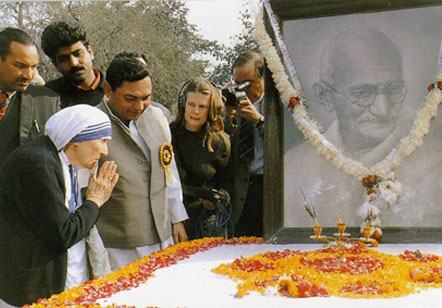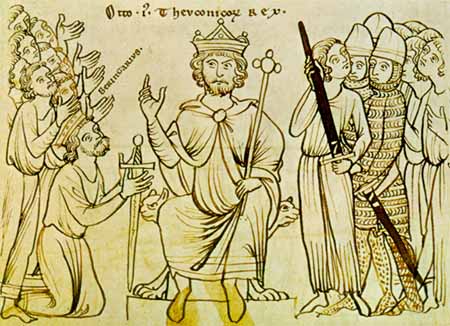Today, the First Sunday of Advent, 2011, was truly a turning point for the Roman Rite. After forty-one years of lame-duck ICEL translations, we have finally gotten an English translation that (I believe) does justice to the Latin text. One can still say that the Latin text of the NO is inferior to the Latin of the TLM, which I agree; but you must also agree that we are way better off with the 3rd edition than the 2nd.
As we cross this new threshold, perhaps we ought to step back and look at what it means to be a Trad now, in the second decade of the new millennium during the pontificate of Benedict XVI. With the legalization of the Extraordinary Form, with a pontiff who has encouraged liturgical excellence, removed (some) of the leading liberal offenders from positions of influence within the Vatican, and with Tradition everywhere on the march and the forces of dissent and disorder everywhere in retreat, does it still make sense to be a Trad? To what degree do our grievances now converge with those of mainstream conservative Catholics? In other words, is Traditionalism becoming redundant?
Pro Multis?
For example, in the past, the translation of "pro multis" as "for all" was cause for serious alarm among traditionalists. Some, such as Rama P. Coomaraswamy in his book Problems With the New Mass, speculated that the translation "for all" actually invalidated the sacrament and that faithful Catholics were bound to refrain from attending masses that used this translation. But has not that difficulty dissolved over night with the new translation? We now have an English prayer that corresponds with the Latin and more faithfully teaches Catholic doctrine. The USCCB commentary on this is actually (surprisingly) helpful. It states:
For example, in the past, the translation of "pro multis" as "for all" was cause for serious alarm among traditionalists. Some, such as Rama P. Coomaraswamy in his book Problems With the New Mass, speculated that the translation "for all" actually invalidated the sacrament and that faithful Catholics were bound to refrain from attending masses that used this translation. But has not that difficulty dissolved over night with the new translation? We now have an English prayer that corresponds with the Latin and more faithfully teaches Catholic doctrine. The USCCB commentary on this is actually (surprisingly) helpful. It states:
"However, the more noticeable revision in those same lines is the replacement of “for all” with “for many.” At the most basic level, “for many” is a faithful translation of the original Latin phrase, “pro multis.” Turning to Scripture, Isaiah 53:12 prophesied that the Messiah would take away “the sins of many,” and Christ Himself at the Last Supper also said His Blood would be shed for “many” (Mt 26:28, Mk 14:24).
This does not mean that Christ did not die for the sake of all humanity, for that, too, is indisputable from Scripture. We need only recall 2 Corinthians 5:15 – “He indeed died for all, so that those who live might no longer live for themselves but for him who for their sake died and was raised.” Rather, “for many” upholds the reality that each individual must also accept and abide in the grace won by Christ in order to attain eternal life. The recovery of this wording affirms that salvation is not completely automatic.
Nonetheless, it should not be interpreted as overly restrictive, either. The fact that Jesus was addressing only the Apostles in the Upper Room while saying, “for you and for many,” implies far-reaching inclusion – that many more besides the Twelve would benefit from this new covenant."
For many years, this is what Trads were banging their heads against the wall about - that the rendering of "pro multis" as "for all" implied universalism. Now we not only have the offending translation gone for good, but the orthodox teaching on "pro multis" explained - and from the USCCB, nonetheless! These are strange times.
The Status of the Extraordinary Form
Another example, of course, is the Extraordinary Form. For decades this was the bedrock of what it meant to be a Traditionalist - that you were among a group of Catholics who, for whatever reason, were "attached" to the old rite and preferred to worship according to the 1962 Missal. Much Trad antagonism developed during the 80's and 90's as Trads fought tooth and nail for the right to have the Mass said in the old form.
Since September, 2007, that Mass has been completely legalized and is available (in theory) to anybody who asks for it. No more can Trads accuse the pope or the Church or denying them this treasure; in fact, Benedict has gone out of his way to promote it. We can still list individual prelates who are trying to stop up the EF Mass in their dioceses, but with the power of the Supreme Pontiff behind it, things are moving in a very positive way for the Traditional Latin Mass. Does it still make sense to talk about the ecclesiastical "man" oppressing Trads when the pope has gone out of the way to accommodate us, even revoking the hated SSPX excommunications as a gesture of reconciliation?
Another example, of course, is the Extraordinary Form. For decades this was the bedrock of what it meant to be a Traditionalist - that you were among a group of Catholics who, for whatever reason, were "attached" to the old rite and preferred to worship according to the 1962 Missal. Much Trad antagonism developed during the 80's and 90's as Trads fought tooth and nail for the right to have the Mass said in the old form.
Since September, 2007, that Mass has been completely legalized and is available (in theory) to anybody who asks for it. No more can Trads accuse the pope or the Church or denying them this treasure; in fact, Benedict has gone out of his way to promote it. We can still list individual prelates who are trying to stop up the EF Mass in their dioceses, but with the power of the Supreme Pontiff behind it, things are moving in a very positive way for the Traditional Latin Mass. Does it still make sense to talk about the ecclesiastical "man" oppressing Trads when the pope has gone out of the way to accommodate us, even revoking the hated SSPX excommunications as a gesture of reconciliation?
Perhaps the movement known as "Traditionalism" will be simply absorbed into mainstream orthodox Catholicism? Perhaps "Trads", as we have come to know ourselves, will find less and less general problems to worry about and the label will be increasingly restricted to those who have a particular affiliation with the cause of the SSPX. Are we witnessing the end of Traditionalism?
Still a Long Way to Go
Even if some "legal" or rubrical matters have been set in place, there is still an enormous amount of work to be done that I think ensures that Traditionalist movement is not going anywhere. For one thing, the Extraordinary Form, though "legal", is not widely practiced. Only a few bishops have celebrated it publicly since Summorum Pontificum, and while the EF has gotten more attention since 2007, the vast majority of Catholics still either have not attended one or have no access to one. There has been some change, of course; my parish is a prime example. But basically, we have simply moved from a de jure restriction on the EF to a de facto restriction, which s unfortunately more difficult to overcome since it depends not on changing laws and norms but on changing hearts and minds. Changing rules is never enough on its own, though it is a good start. And, when the majority of conservative Catholics simply assert the goodness of the remaining rules just because the rules exist (communion in the hand, altar girls, etc), we see there is still much to be done.
Furthermore, we still have the problem of faithless implementation - despite the pope's preference for communion on the tongue, communion in the hand is still the norm. Despite his preference and teaching on celebration of Mass ad dominum, versus populum is practiced in 99% of parishes in America. Despite all the directives of the previous two popes, EMHC are still in existence way beyond their necessity, Mass is still ad libbed in most parishes, and our Lord is abused in the Blessed Sacrament. This has always been a problem, and Trads as well as mainstream conservative Catholics have bemoaned it. As long as this state of affairs continues, Traditionalism will remain as a vibrant antidote.
Not to mention the problems at Vatican. Even though Benedict XVI has made some admirable, wonderful strides towards restoring tradition, he is still caught up in the reformist, post-conciliar mindset, as is most of the Vatican. The Magisterium still thinks it is a good idea to invite pagans to Assisi to pray to their false gods. Our prelates still shrink timidly before the rebukes of Jews and Muslims. Our Vatican committees still have faith in the secularist vision of a one world authority in matter political and fiscal. Darwinian evolution is still accepted as dogma in many otherwise orthodox circles, and even popular priests noted for their eloquent and orthodox exposition of the Faith are denying the historical existence of a literal Adam and Eve. This stuff is not going on among dissenters, but among those who classify themselves as faithful, orthodox Catholics, which is very troubling. And it is promoted and encouraged from the Vatican. There is a deep-seated mindset, a way of approaching the Faith, that needs to change at the highest levels before Traditionalism as a movement will fade.
Finally, I would mention that mainstream, conservative Catholicism still seems (in my opinion) to be too caught up in political conservatism; i.e., the Republican Right. While I think generally the Republican Right is a better fit for a Catholic than the Liberal Left, I heartily dispute that it is the best possible fit. We have always seen the greatest interest in Distributism and authentic Catholic teaching on social justice coming from Trad circles; this is beginning to broaden, but I think mainstream conservative Catholicism is still too enmeshed in the same mire as the Protestant Right in this country for Trads to merge with it.
So, while 2011 is a heck of a lot better than 2001 or 1991, we still have a really long way to go. The changes that have come down since Benedict took the papal throne have been extraordinary; more than I ever thought I'd see in my life. If anything, they have showed up that there is light at the end of the tunnel - that no matter how long we wander in the wilderness, there is a promised land to come into. But we are not there yet.
Benedict has done a lot of great stuff, but there is still a lot that he has left undone; in the words of the Scriptures, with reference to King Asa, "he did what was right in the eyes of the LORD, as his father David had done...nevertheless, he did not remove the high places" (1 Kings 15:11, 14). I think we could make a similar statement with regards to the current state of the Church - that Benedict XVI has done what was right in the sight of the Lord, freeing up the Extraordinary Form, making some needed administrative changes, encouraging ad orientem and communion in the tongue and the rails, but nevertheless, he has not turned from the deeds of his episcopal forefathers, nor has he removed the "high places" (interreligious dialogue sham meetings?).
As long as this remains the case, I think Traditionalism is here to stay.









